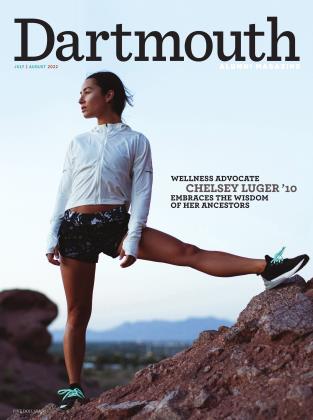MAKING AMENDS Occom’s Legacy
Repatriation ceremony acknowledges a broken promise.
JULY | AUGUST 2022 Farah Lindsey-Almadani ’25Repatriation ceremony acknowledges a broken promise.
JULY | AUGUST 2022 Farah Lindsey-Almadani ’25MAKING AMENDS Occom’s Legacy
notebook
CAMPUS
notes from around the green
Repatriation ceremony acknowledges a broken promise.
Under a tent in front of the Mohegan Church in Uncasville, Connecticut, President Phil Hanlon ’77 handed a small gray box to Mohegan Tribal Council Chairman James Gessner Jr. Later in the solemn proceedings of April 27, members of the tribe honored Hanlon by wrapping him in a ceremonial blanket. They also gave the College a purple and white wampum belt to signify the bond of friendship and the end of conflict between the Mohegans and Dartmouth.
The small box had great significance: It contained a sample of the large, archived collection of the papers of 18th-century Mohegan tribal member Samson Occom. The College was returning his letters, sermons, journals, even a page of recipes for Indigenous herbal remedies to the tribe.
Occom (1723-92) was a preacher and scholar. His former teacher, the Rev. Eleazar Wheelock, planned to create a school in Connecticut to educate Native American youths, and Occom traveled to England, Scotland, and Wales and raised the equivalent of about $2.4 million today for the school. When he returned to the States, he discovered that Wheelock instead founded Dartmouth for the sons of white settlers. Occom never saw the reverend again. Following Occom’s death, a variety of sources sent his papers and other materials to the College.
Hanlon read a letter Occom wrote to Wheelock in 1771 that expressed Occom’s disappointment when he learned of the broken promise. “The anguish in the letter is palpable,” Hanlon said. “Indeed, Dartmouth did little to actualize its founding commitment to Native students for the next two centuries.” By 1970 only 20 Native American students had graduated from the College. Since then, more than 1,200 Native American students have earned degrees.
Sarah Harris ’00, vice chair of the Mohegan Tribal Council and the first Mohegan woman to attend Dartmouth, proposed the repatriation last fall. “Dartmouth has never truly fully embraced the history of its founding and Samson Occom’s role,” Harris says. “For us, the return of the Occom papers is Occom’s spirit coming home.”
Farah Lindsey-Almadani ’25
GREEK LIFE
67
Percentage of eligible students who join a fraternity or sorority
ANNIVERSARIES
50
Years since the founding of the Black Alumni of Dartmouth Association, which held a campus reunion in May
HEAT WAVE
91
Temperature on campus May 14
VISITING VOICES
“Is progress inevitable? Of course not.”
-STEVEN PINKER, AUTHOR AND HARVARD PROFESSOR OF PSYCHOLOGY, AT AN ETHICS INSTITUTE LECTURE IN APRIL
QUOTE/UNQUOTE
“I think I have the connections necessary to work with both students and town residents, which I hope to represent equally.”
—Miles Brown ’23, a government major who is running for a seat in the
New Hampshire State House
A BETTER PATH
The Pine Park Association plans to spend three years making improvements to the park. They hope to control invasive plant species, create a trail that is wheelchair accessible, and get rid of the remaining vestiges of the Hanover Country Club.
 View Full Issue
View Full Issue
More From This Issue
-
 Articles
ArticlesEarth Tones
JULY | AUGUST 2022 By KATE SIBER ’02 -
 Photography
PhotographyTrue Classic
JULY | AUGUST 2022 By RICHARD BABCOCK ’69 -
 Articles
ArticlesNo Man’s Land
JULY | AUGUST 2022 By C.J. Hughes ’92 -
 SPORTS
SPORTSSkaters’ Edge
JULY | AUGUST 2022 By DERON SNYDER -
 notebook
notebook“Standing Up for Democracy”
JULY | AUGUST 2022 By Svati Kirsten Narula ’13 -
 notebook
notebookScholar and Gentleman
JULY | AUGUST 2022 By SUE SHOCK
Farah Lindsey-Almadani ’25
Notebook
-
 notebook
notebookCAMPUS CONFIDENTIAL
JANUARY | FEBRUARY 2017 -
 notebook
notebookMoving On
SEPTEMBER | OCTOBER 2018 -
 Notebook
NotebookThe Voyager
SEPTEMBER | OCTOBER 2024 By DENIS O’NEILL '70 -
 notebook
notebookWinning Trio
JULY | AUGUST 2021 By Maud McCole ’23 -
 notebook
notebookEUREKA!
MAY | JUNE 2021 By Nancy Schoeffler -
 Notebook
NotebookCAMPUS CONFIDENTIAL
NOVEMBER | DECEMBER 2024 By Nancy Schoeffler


